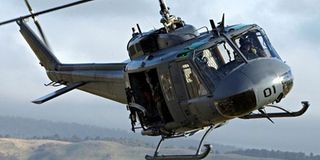US explains Shs265b combat helicopters’ aid to Uganda

A picture of one of the Huey II attack helicopters that the US has donated to UPDF. Courtesy photo
What you need to know:
- The US announcement came after the declaration in June by the Chief of Defence Forces (CDF), Gen Katumba Wamala.
- The MI-24 choppers crashed while on their way to join the mission to fight the Al-Qaeda linked al-Shabaab.
KAMPALA
The US embassy has clarified that America’s $79million (Shs265b) military aid to Uganda is aimed at bolstering the capacity of the Uganda People’s Defence Forces (UPDF) in the fight against terror and not replacement for UPDF’s choppers that crashed in Kenya.
The MI-24 choppers crashed while on their way to join the mission to fight the Al-Qaeda linked al-Shabaab militias under the UN sponsored African Union Mission (Amisom) in Somalia. However, the Public Affairs Officer at the US embassy in Kampala, Ms Susan Parker-Burns on Wednesday said the aid was not precipitated by those talks.
“The helicopters are not replacements but are to enhance the UPDF’s capabilities,” she explained in her email to Daily Monitor. She added: “The US government is pleased to provide five Huey-II helicopters, spare parts, and training to the Uganda People’s Defence Force (UPDF) for operations in support of Amisom”.
The US Department of Defence announced Monday it had contracted an American firm Bell Helicopter, to produce and supply Uganda with five Huey II helicopters.
In March during a gathering at Entebbe Airbase Gen Katumba Wamala said the Ugandan government was engaging that of the US with a view of having the three Russian made Uganda Airforce choppers that crashed on the slopes of Mount Kenya on August 2012 replaced.
The US announcement came after the declaration in June by the Chief of Defence Forces (CDF), Gen Katumba Wamala, that Uganda is to pull its troops out of the Amisom mission in December 2017. Gen Katumba cited lack of financial resources to bankroll the fight and frustrations arising out of the Somali government’s failure to build an own capacity to deal with the al-Shabaab militants.



